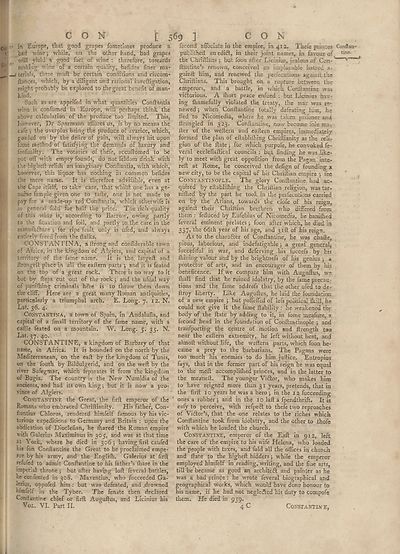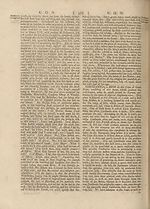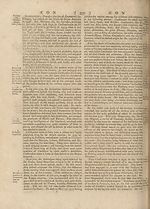Encyclopaedia Britannica, or, a Dictionary of arts, sciences, and miscellaneous literature : enlarged and improved. Illustrated with nearly six hundred engravings > Volume 6, CHI-Crystallization
(615) Page 569
Download files
Complete book:
Individual page:
Thumbnail gallery: Grid view | List view

?
CON [ 569 ] CON
t- in Europe, that good grapes fametlmes produce a
bad wine j while, on the other hand, bad grapes
will yield a good fort of wine : therefore, towards
making wine of a certain quality, hefides finer ma-
terials, there muft be certain conditions and circum*
fiances, which, by a diligent and rational invefligation,
might probably be explored to the great benefit of man*
kind.
Such as are apprifed in what quantities Conftantia
wine is confumed in Europe, svill perhaps think the
above calculation of the produce too limited. This,
however, Dr Sparmahn affures us, is by no means the
cafe •, the overplus being the produce of avarice, which,
goaded on by the defire of gain, will always Kit upon
feme method of fatisfying the demands of luxury and
fenfuality. The votaries of thefe, accuflorned to be
put crtT with empty founds, do not feldom drink with
the higheft relilh an imaginary Coriftantia, with which,
however, this liquor has nothing in common befides
the mere name. It is therefore advifabie, even at
the Cape itfelf, to take care, that w'hilft one has a ge¬
nuine fample given one to tafle, one is not made to
pay far a made-up red Conftantia, which otherwife is
in general fold for half the price. The rich quality
of this wine is, according to Barrow, owing partly
to the fituation and foil, and partly to the care in the
manutStfhire j for ripe fruit only is ufed, and always
entirely freed From the (talks.
CONST AN TINA, a llrong and confiderable town
of Africa, in the kingdom of Algiers, and capital of a
territory of the fame name. It is the largeft and
flrongeft place in all the eaflern parts •, and it is feated
on the top of a great rock. There is no way to it
but by fteps cut out of the rock j and the ufual way
of punifhing criminals here is to throw them down
the cliff. Here are a great many Roman antiquities,
particularly a triumphal arch. E. Long. 7. 12. N.
Lat. 36. 4.
Constanttna, a town of Spain, in Andalufia, and
capital of a fmall territory of the fame name, with a
callle feated on a mountain. W. Long. 5. 35. N.
Lat. 37. 40.
CONSTANTINE, a kingdom of Barbary of that
name, in Africa. It is bounded on the north by the
Mediterranean, on the call by the kingdom of Tunis,
on the fouth by Bildulgerid, and on the weft by the
river Sufegmar, which feparates it from the kingdom
of Bugia. The country is the New Numidia of the
ancients, and had its own king; but it is now a pro¬
vince of Algiers.
Constantine the Great, the firft emperor of the
Romans who embraced Chriftianity. His father, Con-
ftantius Chlorus, rendered himfelf famous by his vic¬
torious expeditions to Germany and Britain : upon the
abdication of Dioclefian, he (hared the Roman empire
with Galenas Maximinus in 365, and was at that time
at York, where he died in 306; having firft caufed
his fon Conftantine the Great to be proclaimed empe¬
ror by his army, and the Englifti. Galerius at firft
refuted to admit Conftantine to his father’s (hare in the
imperial throne ; but after having loft feveral battles,
he confented in 308. Maxentius, who fucceeded Ga-
icrius, oppofed him : but was defeated, and drowned
himfelf in the Tyber. The fenate then declared
Conftantine chief or firft Auguftus, and Licinius his
Vojl. VI. Part II.
fecond affociute in the empire, in 412. Thefe princes Conftan-
publdhed an edidl, in their joint names, in favour of t“ie‘
the Chriftians; but foon after Licinius, jealous of Con-
ftantine’s renown, conceived an implacable hatred a-
gainft him, and renewed the perfecutions againtt the
Chriftians. This brought on a rupture between the
emperors, and a battle, in which Conftantine was
victorious. A Ihort peace enfued : but Licimus h?.V’
ing (hamefully violated the treaty, the war was re¬
newed ; when Conftantine totally defeating him, ha
fled to Nicomedia, where he was taken prifoner ana
ftrangled in 323. Conftantine, now become ible m2,
fter of the weftern and eaftern empires, immediately
formed the plan of eftablilhing Chriftianity as the relir
gion of the (late; for which purpole, he convoked fe¬
veral ecclefiaftical councils : but finding he was like¬
ly to meet with great oppofition from the Pagan inte-
reft at Rome, he conceived the defign of founding a
new city, to be the capital of his Chriftian empire ; fee
Constantinople. The glory Conftantine had ac¬
quired by eftablilhing the Cln jftian religion, was tar-
nifned by the part he took in the perfecutions carried
on by the Arians, towards the clofe of his reign,
againft their Chriftian brethren who differed from
them : feduced by Eufebius of Nicomedia, he banilhed
feveral eminent prelates; foon after which, he died in
337, the 66th year of his age, and 3.1ft of his reign.
As to the character of Conftantine, he was chafte,
pious, laborious, and indefatigable; a great general,
fuccefsful in war, and deferving his fuccefs by his
(Inning valour and by the brightnefs of his genius ; a
proteCfor of arts, and an encourager of them by his
beneficence. If we compare him with Auguftus, we
(hall find that he ruined idolatry, by the fame precau¬
tions and the fame addrefs that the other ufed to de?
(troy liberty. Like Auguftus, he laid the foundation
of a new empire ; but pofleffed of lefs political (kill, he
could not give it the fame (lability : he weakened the
body of the date by adding to it, in ibrne meafure, a
fecond head in the foundation of Conftahdnople ; and
tranfporting the centre of motion and ftrength too
near the eaftern extremity, he left without heat, and
almoft without life, the weftern parts, which foon be¬
came a prey to the barbarians. The Pagans were
too much his enemies • to do him juftice. Eutropius
fays, that in the former part of his reign he was equal
to the rr.oft accomplilhed princes, and in the latter to
the meaneft. The younger ViCtor, who makes him
to have reigned more than 31 years, pretends, that in
the firft: 10 years he was a hero; in the 12 fucceeding
ones a robber; and in the 10 laft a fpendthrift. It is
eafy to perceive, with refpeft to thefe two reproaches
of Victor’s, that the one relates to the riches which
Conftantine took from idolatry, and the other to thofe
with which he loaded the church.
Constantine, emperor of the Eaft in 912, left
the care of the empire to his wife Helena, who loaded
the people with taxes, and fold all the offices in church
and (late to the higheft bidders; while the emperor
employed himfelf in reading, writing, and the fine arts,
till he became as good an architeft and painter as he
was a bad prince : he wrote feveral biographical and
geographical works, which would have done honour to
his name, if he had not neglected his duty to compofe
them. Pie died in 959.
4 C Constantin e,
CON [ 569 ] CON
t- in Europe, that good grapes fametlmes produce a
bad wine j while, on the other hand, bad grapes
will yield a good fort of wine : therefore, towards
making wine of a certain quality, hefides finer ma-
terials, there muft be certain conditions and circum*
fiances, which, by a diligent and rational invefligation,
might probably be explored to the great benefit of man*
kind.
Such as are apprifed in what quantities Conftantia
wine is confumed in Europe, svill perhaps think the
above calculation of the produce too limited. This,
however, Dr Sparmahn affures us, is by no means the
cafe •, the overplus being the produce of avarice, which,
goaded on by the defire of gain, will always Kit upon
feme method of fatisfying the demands of luxury and
fenfuality. The votaries of thefe, accuflorned to be
put crtT with empty founds, do not feldom drink with
the higheft relilh an imaginary Coriftantia, with which,
however, this liquor has nothing in common befides
the mere name. It is therefore advifabie, even at
the Cape itfelf, to take care, that w'hilft one has a ge¬
nuine fample given one to tafle, one is not made to
pay far a made-up red Conftantia, which otherwife is
in general fold for half the price. The rich quality
of this wine is, according to Barrow, owing partly
to the fituation and foil, and partly to the care in the
manutStfhire j for ripe fruit only is ufed, and always
entirely freed From the (talks.
CONST AN TINA, a llrong and confiderable town
of Africa, in the kingdom of Algiers, and capital of a
territory of the fame name. It is the largeft and
flrongeft place in all the eaflern parts •, and it is feated
on the top of a great rock. There is no way to it
but by fteps cut out of the rock j and the ufual way
of punifhing criminals here is to throw them down
the cliff. Here are a great many Roman antiquities,
particularly a triumphal arch. E. Long. 7. 12. N.
Lat. 36. 4.
Constanttna, a town of Spain, in Andalufia, and
capital of a fmall territory of the fame name, with a
callle feated on a mountain. W. Long. 5. 35. N.
Lat. 37. 40.
CONSTANTINE, a kingdom of Barbary of that
name, in Africa. It is bounded on the north by the
Mediterranean, on the call by the kingdom of Tunis,
on the fouth by Bildulgerid, and on the weft by the
river Sufegmar, which feparates it from the kingdom
of Bugia. The country is the New Numidia of the
ancients, and had its own king; but it is now a pro¬
vince of Algiers.
Constantine the Great, the firft emperor of the
Romans who embraced Chriftianity. His father, Con-
ftantius Chlorus, rendered himfelf famous by his vic¬
torious expeditions to Germany and Britain : upon the
abdication of Dioclefian, he (hared the Roman empire
with Galenas Maximinus in 365, and was at that time
at York, where he died in 306; having firft caufed
his fon Conftantine the Great to be proclaimed empe¬
ror by his army, and the Englifti. Galerius at firft
refuted to admit Conftantine to his father’s (hare in the
imperial throne ; but after having loft feveral battles,
he confented in 308. Maxentius, who fucceeded Ga-
icrius, oppofed him : but was defeated, and drowned
himfelf in the Tyber. The fenate then declared
Conftantine chief or firft Auguftus, and Licinius his
Vojl. VI. Part II.
fecond affociute in the empire, in 412. Thefe princes Conftan-
publdhed an edidl, in their joint names, in favour of t“ie‘
the Chriftians; but foon after Licinius, jealous of Con-
ftantine’s renown, conceived an implacable hatred a-
gainft him, and renewed the perfecutions againtt the
Chriftians. This brought on a rupture between the
emperors, and a battle, in which Conftantine was
victorious. A Ihort peace enfued : but Licimus h?.V’
ing (hamefully violated the treaty, the war was re¬
newed ; when Conftantine totally defeating him, ha
fled to Nicomedia, where he was taken prifoner ana
ftrangled in 323. Conftantine, now become ible m2,
fter of the weftern and eaftern empires, immediately
formed the plan of eftablilhing Chriftianity as the relir
gion of the (late; for which purpole, he convoked fe¬
veral ecclefiaftical councils : but finding he was like¬
ly to meet with great oppofition from the Pagan inte-
reft at Rome, he conceived the defign of founding a
new city, to be the capital of his Chriftian empire ; fee
Constantinople. The glory Conftantine had ac¬
quired by eftablilhing the Cln jftian religion, was tar-
nifned by the part he took in the perfecutions carried
on by the Arians, towards the clofe of his reign,
againft their Chriftian brethren who differed from
them : feduced by Eufebius of Nicomedia, he banilhed
feveral eminent prelates; foon after which, he died in
337, the 66th year of his age, and 3.1ft of his reign.
As to the character of Conftantine, he was chafte,
pious, laborious, and indefatigable; a great general,
fuccefsful in war, and deferving his fuccefs by his
(Inning valour and by the brightnefs of his genius ; a
proteCfor of arts, and an encourager of them by his
beneficence. If we compare him with Auguftus, we
(hall find that he ruined idolatry, by the fame precau¬
tions and the fame addrefs that the other ufed to de?
(troy liberty. Like Auguftus, he laid the foundation
of a new empire ; but pofleffed of lefs political (kill, he
could not give it the fame (lability : he weakened the
body of the date by adding to it, in ibrne meafure, a
fecond head in the foundation of Conftahdnople ; and
tranfporting the centre of motion and ftrength too
near the eaftern extremity, he left without heat, and
almoft without life, the weftern parts, which foon be¬
came a prey to the barbarians. The Pagans were
too much his enemies • to do him juftice. Eutropius
fays, that in the former part of his reign he was equal
to the rr.oft accomplilhed princes, and in the latter to
the meaneft. The younger ViCtor, who makes him
to have reigned more than 31 years, pretends, that in
the firft: 10 years he was a hero; in the 12 fucceeding
ones a robber; and in the 10 laft a fpendthrift. It is
eafy to perceive, with refpeft to thefe two reproaches
of Victor’s, that the one relates to the riches which
Conftantine took from idolatry, and the other to thofe
with which he loaded the church.
Constantine, emperor of the Eaft in 912, left
the care of the empire to his wife Helena, who loaded
the people with taxes, and fold all the offices in church
and (late to the higheft bidders; while the emperor
employed himfelf in reading, writing, and the fine arts,
till he became as good an architeft and painter as he
was a bad prince : he wrote feveral biographical and
geographical works, which would have done honour to
his name, if he had not neglected his duty to compofe
them. Pie died in 959.
4 C Constantin e,
Set display mode to:
![]() Universal Viewer |
Universal Viewer | ![]() Mirador |
Large image | Transcription
Mirador |
Large image | Transcription
Images and transcriptions on this page, including medium image downloads, may be used under the Creative Commons Attribution 4.0 International Licence unless otherwise stated. ![]()
| Permanent URL | https://digital.nls.uk/193015418 |
|---|
| Attribution and copyright: |
|
|---|
| Description | Ten editions of 'Encyclopaedia Britannica', issued from 1768-1903, in 231 volumes. Originally issued in 100 weekly parts (3 volumes) between 1768 and 1771 by publishers: Colin Macfarquhar and Andrew Bell (Edinburgh); editor: William Smellie: engraver: Andrew Bell. Expanded editions in the 19th century featured more volumes and contributions from leading experts in their fields. Managed and published in Edinburgh up to the 9th edition (25 volumes, from 1875-1889); the 10th edition (1902-1903) re-issued the 9th edition, with 11 supplementary volumes. |
|---|---|
| Additional NLS resources: |
|

